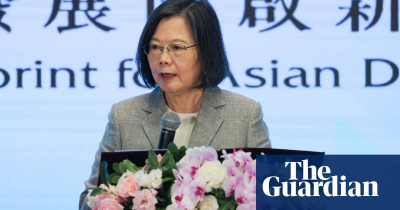The Guardian-Taiwan election may open window for better China ties report says
October 27, 2023 3 min 623 words
这篇报道着重指出,台湾总统选举可能成为重新开始台北和北京对话、降低紧张局势以及减少冲突风险的窗口。国际危机小组的报告认为,虽然并非必然会爆发台湾战争,但当前的走势是危险的。台湾已经被视为中美之间潜在的冲突点,而美国是台湾最坚定的支持者。报告呼吁各方退一步,明确立场,重新建立基本信任。 文章指出中国政府视台湾为中国的一部分,寻求通过和平手段实现统一,但也没有排除使用武力的可能性。台湾政府则坚称台湾已经是一个主权国家,人民强烈反对中国统治,支持复杂但和平的现状。因此,两岸关系陷入了危险的僵局。 报告认为,台湾总统蔡英文即将在明年结束她的第二个任期后卸任,这可能提供“重新开展两岸对话的机会”。如果在当前的敌对局势下难以实现,新的民进党政府可以考虑识别其他领域以作为激励,以换取北京减少经济、军事和政治压力。同时,台湾必须加强自身防卫,以构成“一个可信的威胁,如果中国采取入侵行动,将会难以应付”。 这篇报道还指出,美国在减少台湾紧张局势方面也有一席之地。它提到了高级官员之间的会晤,以及越来越偏向鹰派立场的美国政治家。报告认为,华盛顿最近的行为“可能会加大冲突的可能性”。 总的来说,这篇报道强调了维护台海和平稳定的紧迫性,需要各方采取行动,重建基本信任,以避免潜在的冲突。当前的紧张局势需要通过外交手段来化解,这对于维护全球和平与稳定都至关重要。
Taiwan’s presidential election in January is a window of opportunity to resume dialogue between Taipei and Beijing, reduce tensions and lower the risk of conflict, a report has said.
A war over Taiwan is not inevitable but “the current trajectory is dangerous”, the report, by the International Crisis Group, says.
Taiwan is now considered the greatest potential flashpoint for conflict between China and the US, which is Taiwan’s strongest supporter. It called for all parties to take a step back, clarify their positions, and “re-establish a baseline level of trust”.
The government of China, led by Xi Jinping, considers Taiwan to be a Chinese province and has insisted it will be “reunified”. It seeks to achieve this by peaceful means but has not ruled out using force.
Taiwan’s government, led by the Democratic Progress party’s Tsai Ing-wen, says Taiwan is already a sovereign nation, and its people overwhelmingly reject the prospect of Chinese rule in favour of the complicated but peaceful status quo. Recent polling by Taiwan’s mainland affairs council found 85.3% of the public were opposed to Beijing’s proposal of “one country, two systems”.
Beijing cut off all dialogue with Taipei after Tsai’s election in 2016 in response to the DPP’s position. It has spent years actively deepening Taiwan’s international isolation and punishing it economically, which has only strengthened Taiwanese opposition to unification, leaving the two sides at a dangerous impasse.
Tsai will step down early next year at the end of her second and final term, and the report says the handover could present “a window of opportunity to resume cross-strait dialogue”. In the event of a DPP victory – noting that the opposition KMT already had “an understanding” with Beijing – the report advises the two sides to find a “mutually acceptable political formulation” of the cross-strait relationship.
However if this was a bridge too far under current hostilities, a new DPP government could identify other areas to restart dialogue as incentives for Beijing, in return for a reduction in economic, military and political pressure. At the same time, Taiwan had to improve its defences in order to provide “a credible threat that China will be biting off more than it can chew if it pursues invasion”.
Beijing has increased its military and coercive actions towards Taiwan, including rehearsals of an attack on Taiwan, cyberattacks and drastically scaling up its People’s Liberation Army (PLA) incursions into Taiwan’s air defence identification zone. On Monday, Taiwan’s defence ministry reported that PLA aircraft had carried out multiple operations, including an encirclement of the main island.
The report says the US, which provides weapons to Taiwan for its self-defence but has also become more vocally supportive, also has a part to play in reducing tensions. It noted high-level meetings between officials, and US politicians who were scoring political points with increasingly hawkish stances. It says Washington’s recent behaviour “may well be making conflict more likely”.
“A Chinese invasion of Taiwan is unlikely any time soon, but the risk of conflict is rising,” according to the report by the International Crisis Group’s senior China analyst, Amanda Hsiao.
“Managing it requires the parties to re-establish a baseline level of trust by shoring up longstanding political understandings. Washington should credibly assure Beijing that it does not seek to keep Taiwan permanently separated from the mainland. Taipei should credibly assure Beijing that it does not seek formal independence. Beijing should credibly assure Washington and Taipei that it has not decided to unify with Taiwan through military force.”
Additional research by Chi Hui Lin

